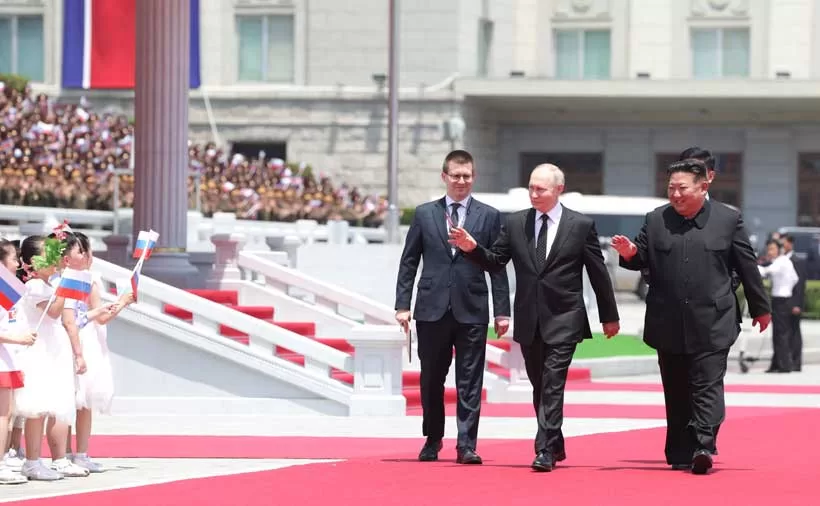Russian President Vladimir Putin’s second visit to Pyongyang, after 24 years, comes with serious attention amidst the growing concerns over the Russia-Ukraine war and North Korea’s nuclear developments. The grand welcome received by Mr. Putin and the lavish reception from President Kim Jong-Un reflects the growing convergence of both countries against their Western counterparts. Mr. Putin expressed his thankfulness to Mr. Kim for supporting what Russia calls a ‘special military operation’ in Ukraine. President Putin also praised North Korea’s fight against the hegemonistic policies, indicating the U.S.
Putin’s visit to North Korea: What it signifies?
The officials were clearly signalling of the deepening the existing partnership ties between Moscow and Pyongyang. However, initially, it was not very clear what the agreement might look like. On Wednesday, President Vladimir Putin concluded his two-day trip to North Korea, by signing a ‘Comprehensive Strategic Partnership Agreement’. The agreement provides mutual assistance in the event of aggression against one of the parties to this agreement. This is one of the most significant moves by Russia to include a mutual defence pledge in the last few years in Asia, upgrading the bilateral relation from partnership to ‘alliance’.
In the press conference, President Kim stated this agreement would be the foundation of the grand and visionary leadership of the two countries to ensure the regional security environment, a milestone achievement of leading the Asian power dynamics into a new direction. As reported by Tass, the Russian news agency, the ‘ground-breaking’ document reflects the strong desire and aspirations of moving towards the collective interest of ‘shared isolation’ policies from the West. Since Russia invaded Ukraine on 28 February, the West initiated economic sanctions ranging from boycotting its products, expelling from SWIFT, and so on. North Korea has been under sanctions from the United Nations (UN) for its ballistic and nuclear programs since 2006.
Evolving bilateral relations
The partnership agreement will have a shadow effect on the existing ties between North Korea and Russia. Historically, throughout the Cold War period, there was agreement between North Korea and the erstwhile USSR, namely, the Treaty of Friendship, co-operation, and mutual assistance, signed on 6th July 1961, emphasizing on promotion of peace and security and the peaceful unification of Korea. In the context of the Cold War era, the treaty made a non-alliance commitment, where both parties agreed not to enter into any alliances or actions directed against each other. Interestingly, when Nikita Khrushchev signed the treaty, committed to defend North Korea in case of an attack, warning the U.S. intervention in the Korean Peninsula.
The collapse of the USSR in 1991, changed the realpolitik. President Boris Yeltsin did not give much attention to the military alliance with Pyongyang. In 2000, when Putin was elected as Russian President, there was an active effort to restore Moscow’s ties with North Korea. Months after his assuming presidency, President Putin travelled to Pyongyang, making him the first Russian leader to visit the country during Kim Jong Il, father of current President Kim Jong Un.
In recent years, the ‘unconditional support’ of North Korea for Russia’s military invasion in Ukraine, calling it the U.S. provoked conflict and Russia’s reciprocation to join China to veto the renewed sanctions against North Korea, despite Pyongyang carrying out a record number of missile tests in last year. Following Col. Gen. Sergei Shoigu’s visit to Pyongyang, the former Defence Minister of Russia, last year erupted grave concern about the North Korea-Russia proximity. The purpose of Shoigu’s visit was to participate in the launching program of a long-range missile test, which is believed to be North Korea’s first ICBM, the Hwasong Intercontinental Ballistic Missile (ICBM). Many analysts consider it will have serious ramifications for international security.
Implications of broader geopolitics
President Putin’s visit to Pyongyang is a strong message to the US, in particular, and the world, in general, that their relations are not only solid but will expand amidst the ground of ‘shared isolation’. The revisionist approach of the two countries based on the vision of a new world order will have implications beyond their borders. The Korean Central News Agency (KCNA) highlighted the bilateral relations between Moscow and Pyongyang as a ‘strategic fortress’ and showed the commitment to a ‘new multipolar world’. The term ‘new multipolar world’ is often used also by the Sino-Russo bloc to target the U.S.-led international order.
Earlier, this year, several reports claimed that there was a deal between North Korea and Russia to supply dozens of ballistic missiles and over ten thousand containers of munitions to Russia to use in its Ukraine war. Although both parties have denied the charges, the integrity of the international security environment is in question over the defence deal between Pyongyang and Moscow. The U.S. Secretary of State Antony Blinken and the NATO Secretary General, Jens Stoltenberg expressed their grave concerns over the close alignment of authoritarian states including Russia, North Korea, China, and Iran. The desperation of Russia to seek alternative partners has made vulnerable Ukraine’s defence in the long term. NATO will have a summit in July, where the focus shall be on strengthening the partnerships with the key players of the Indo-Pacific region like Australia, South Korea, Japan, and others.
